Medicine, Pills, Health insurance, and why I choose not to participate
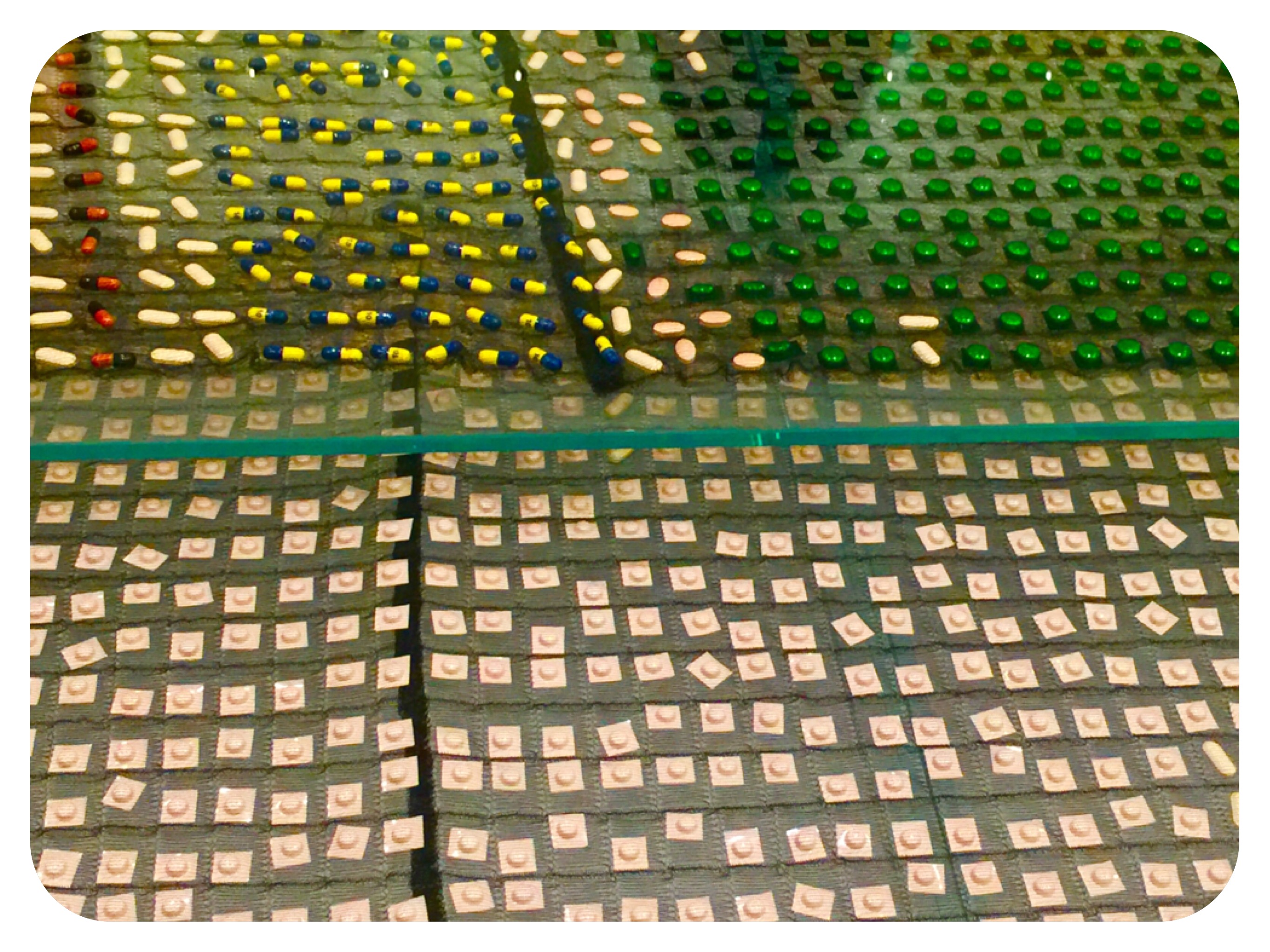
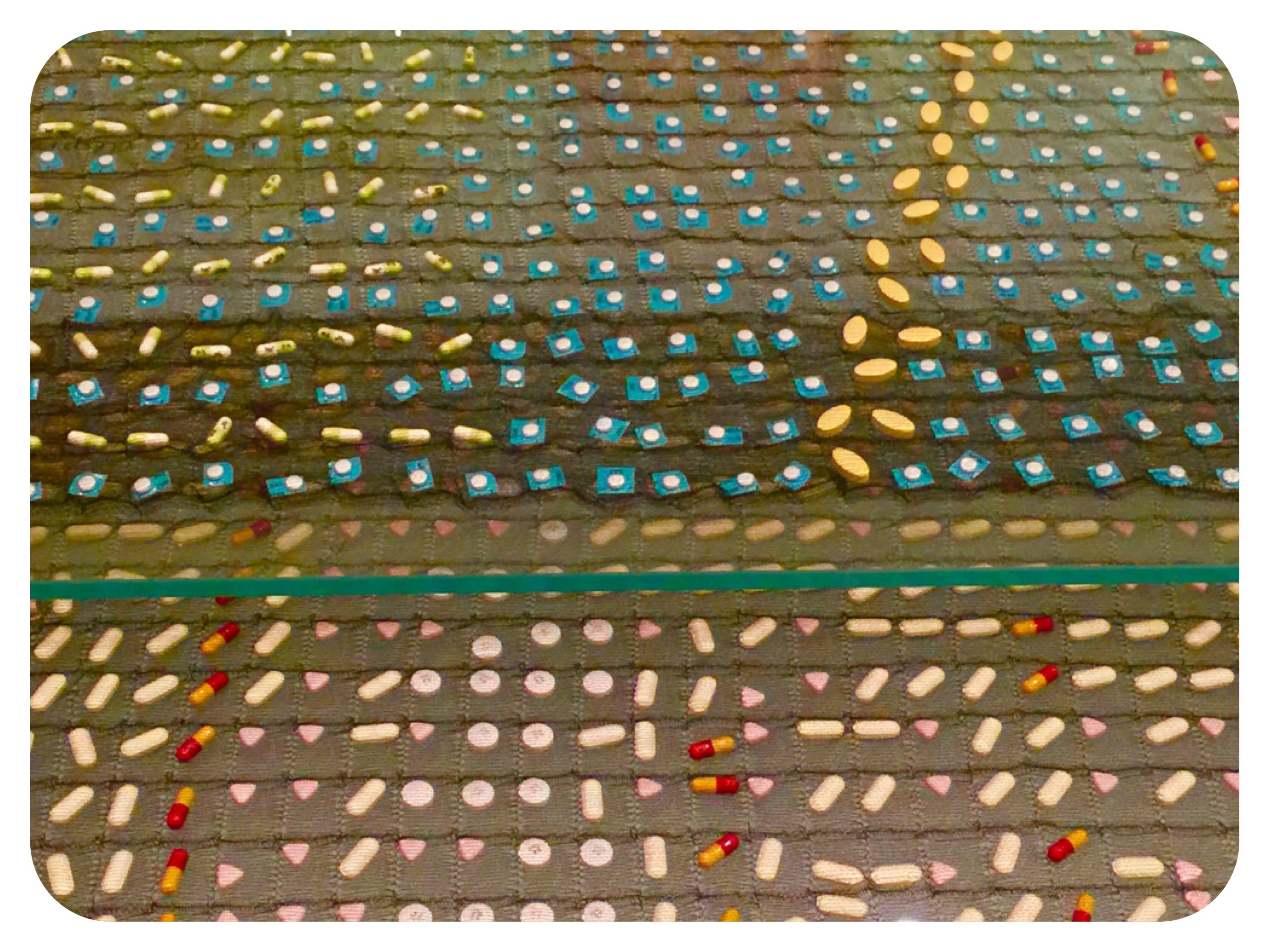
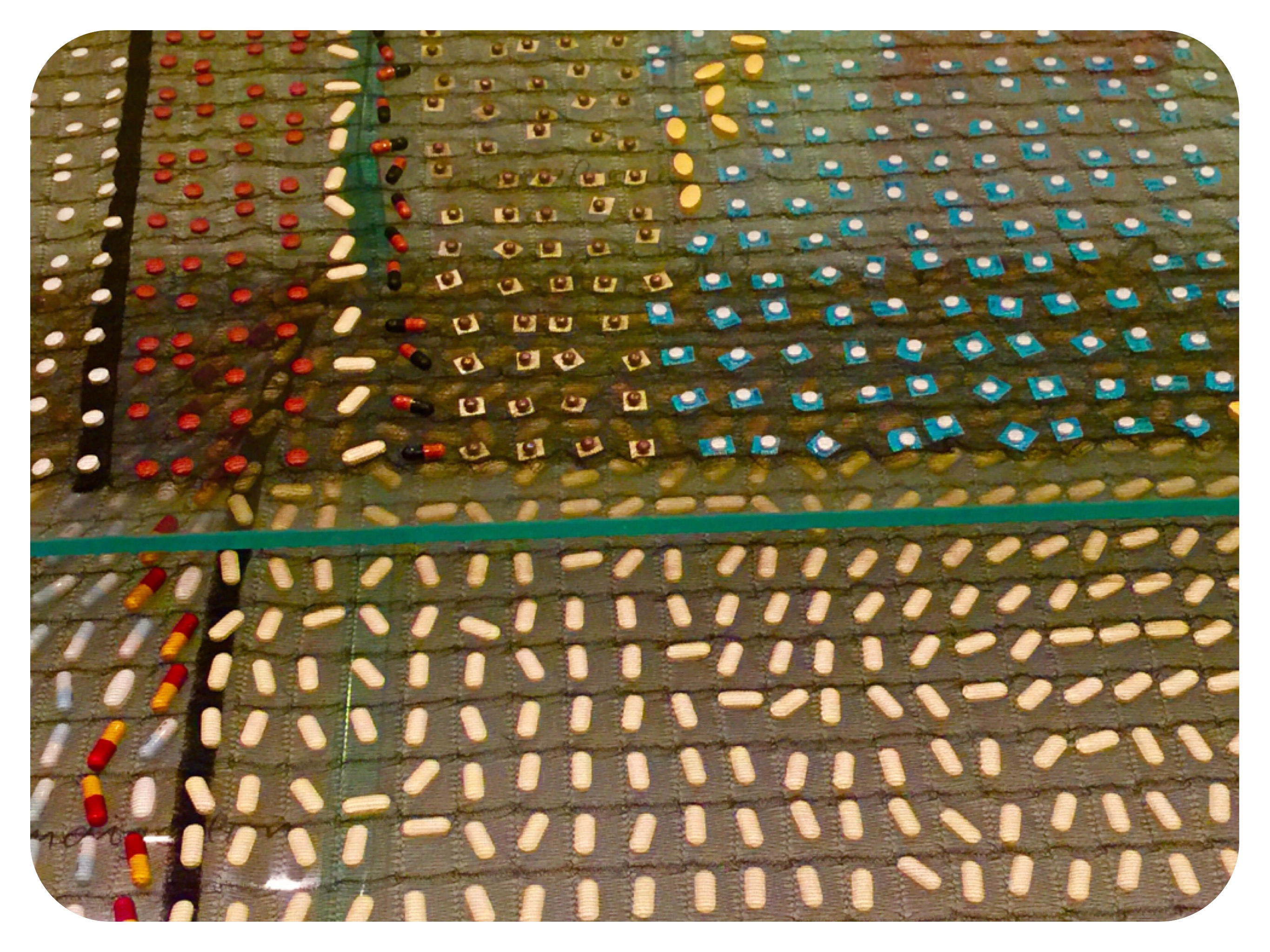
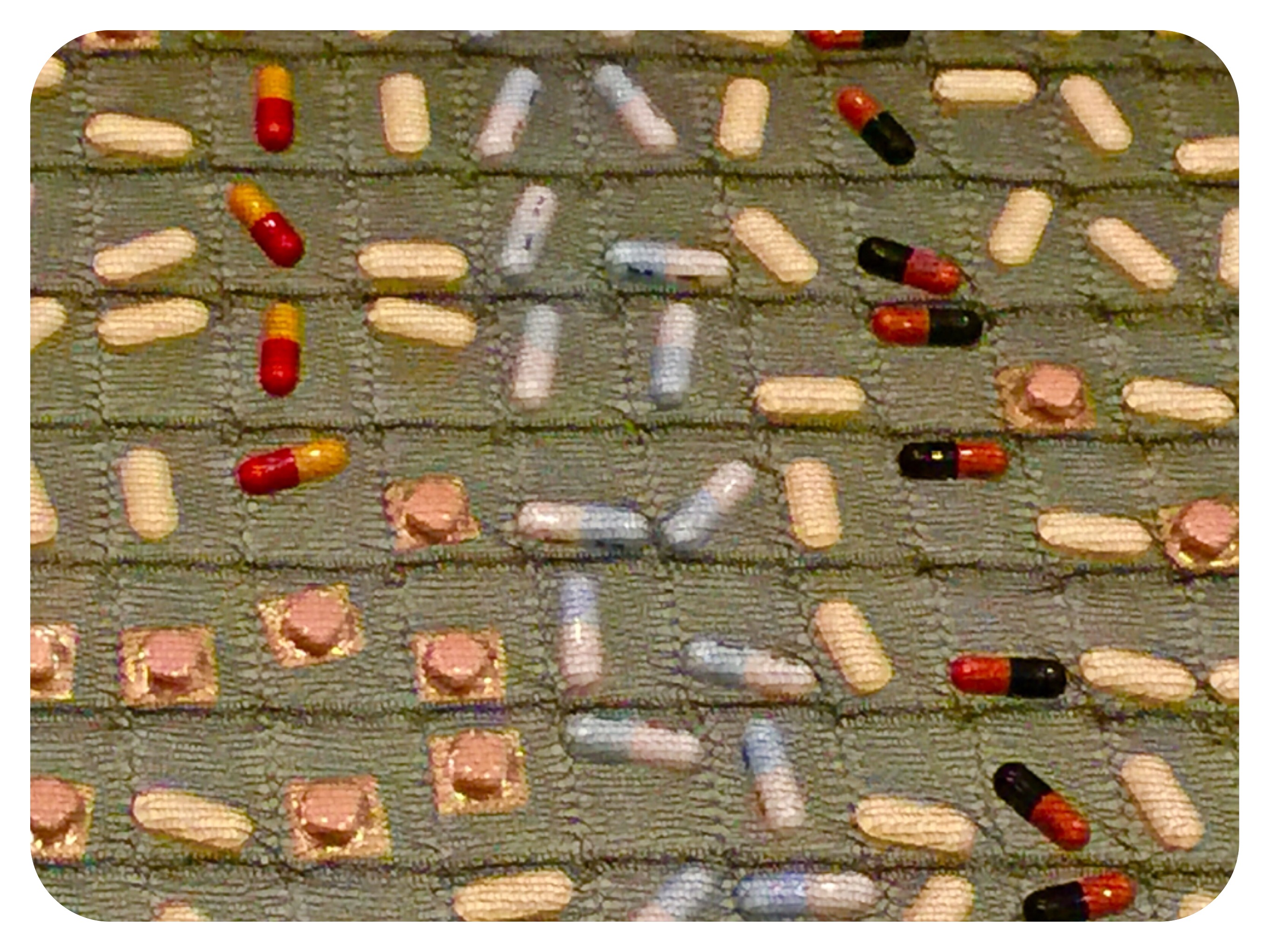
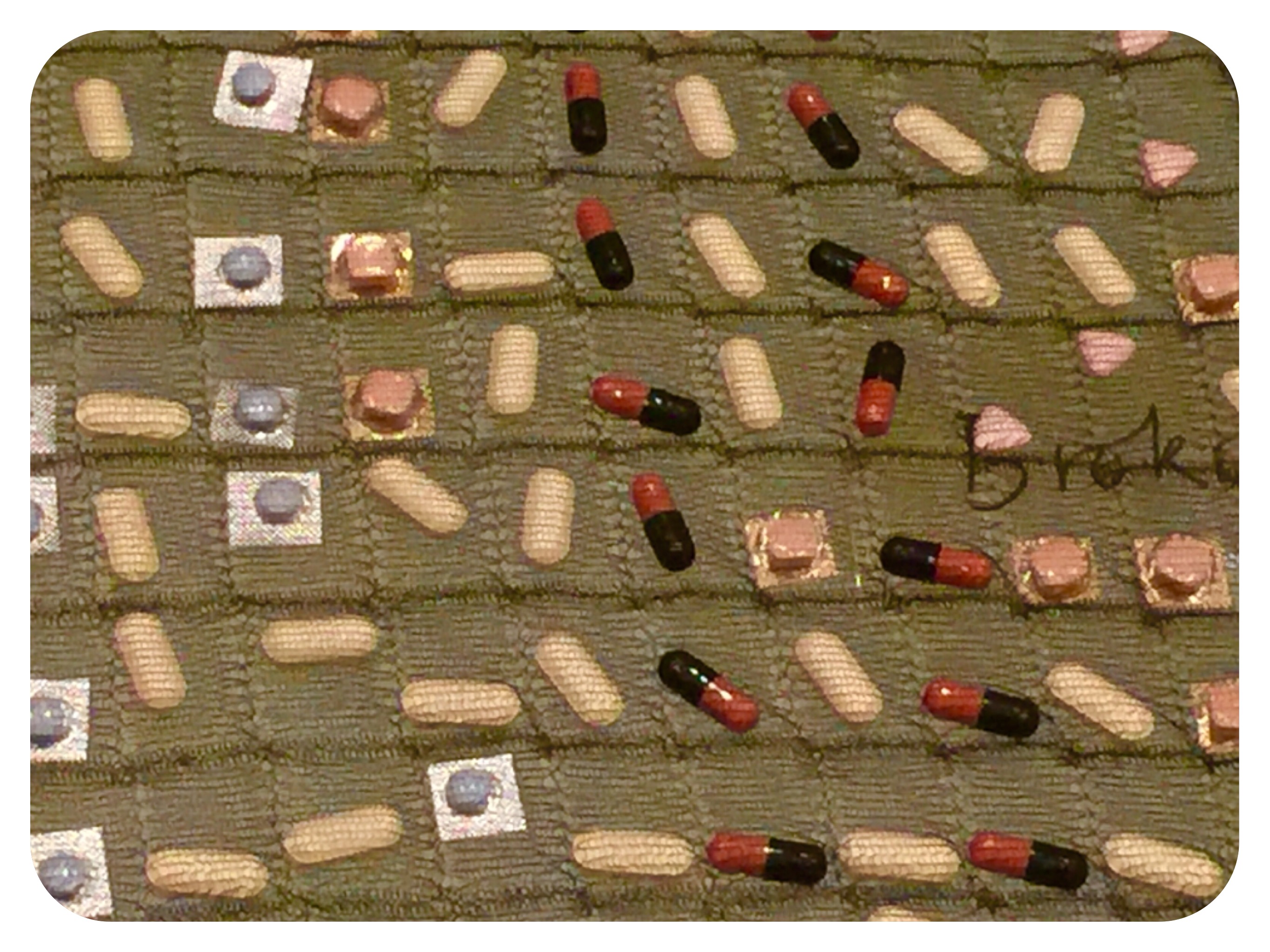
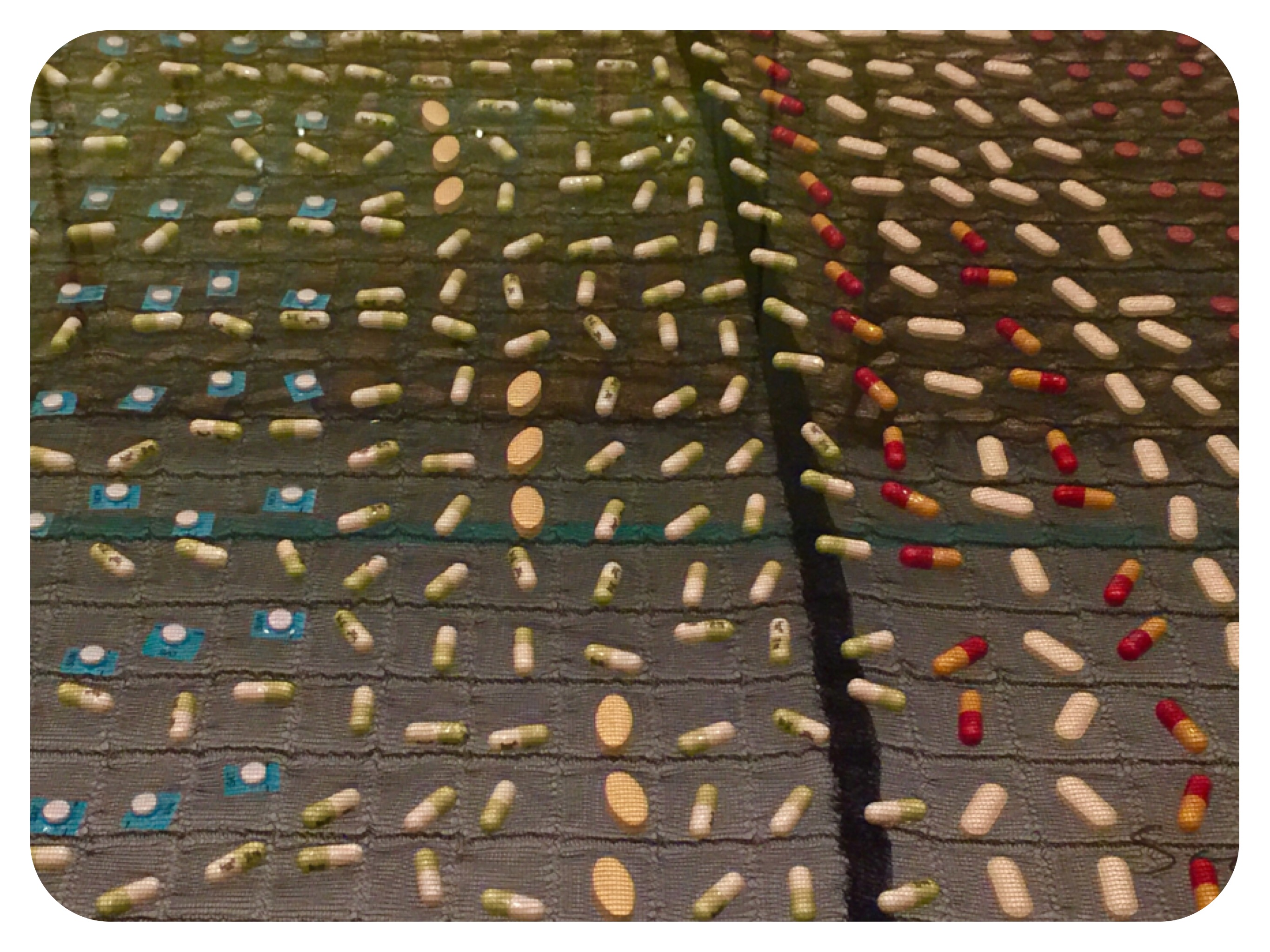
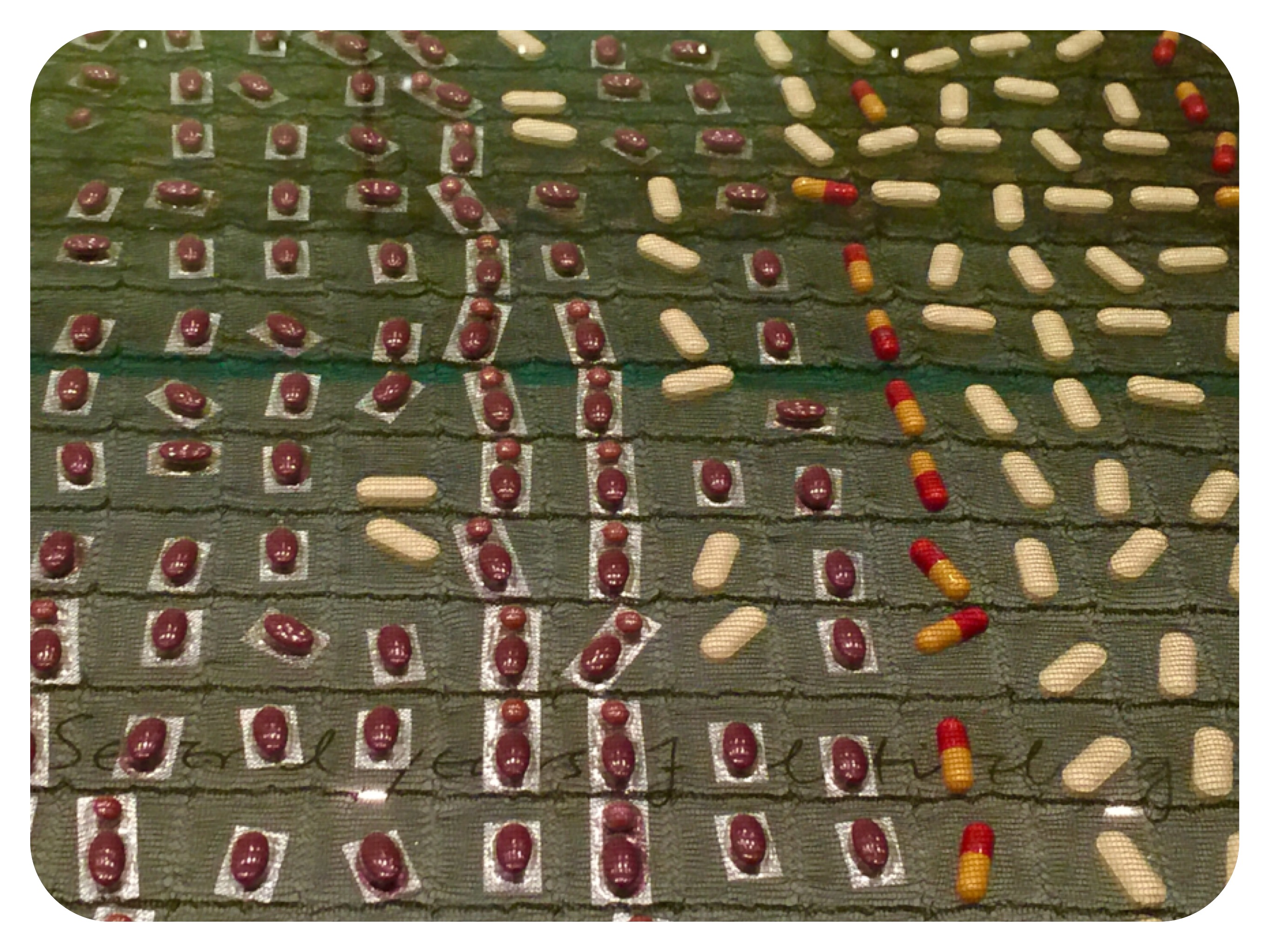
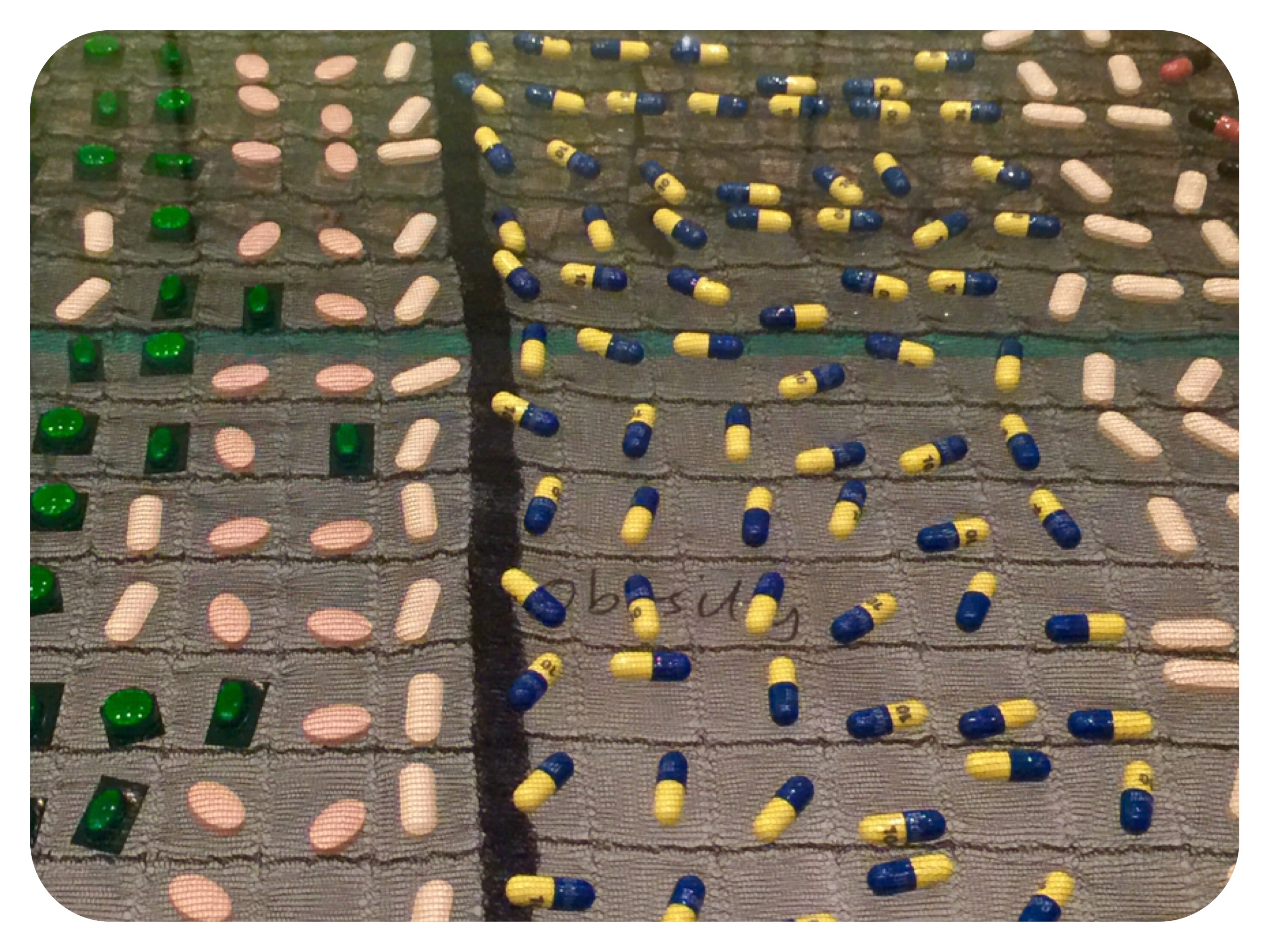
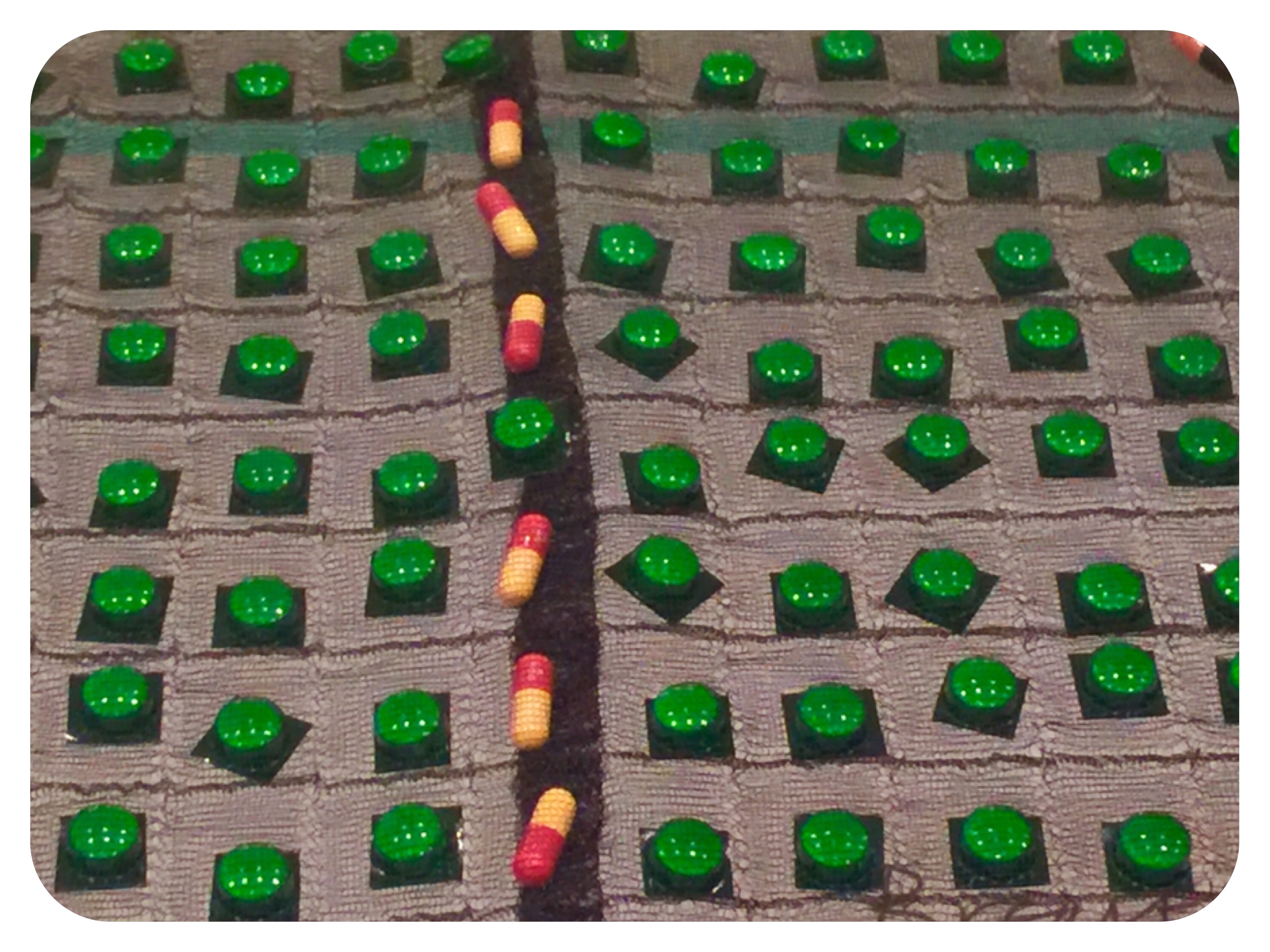
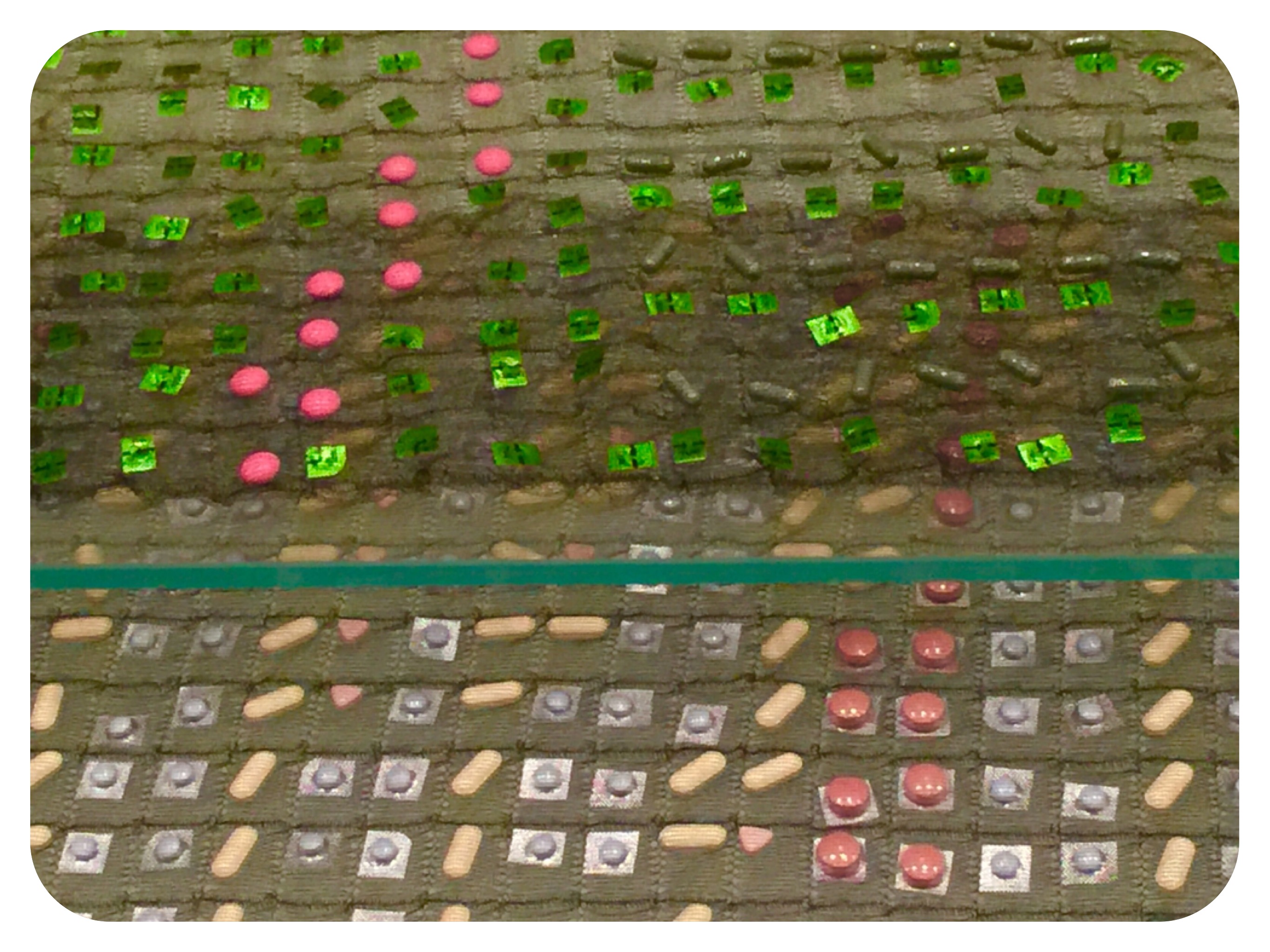
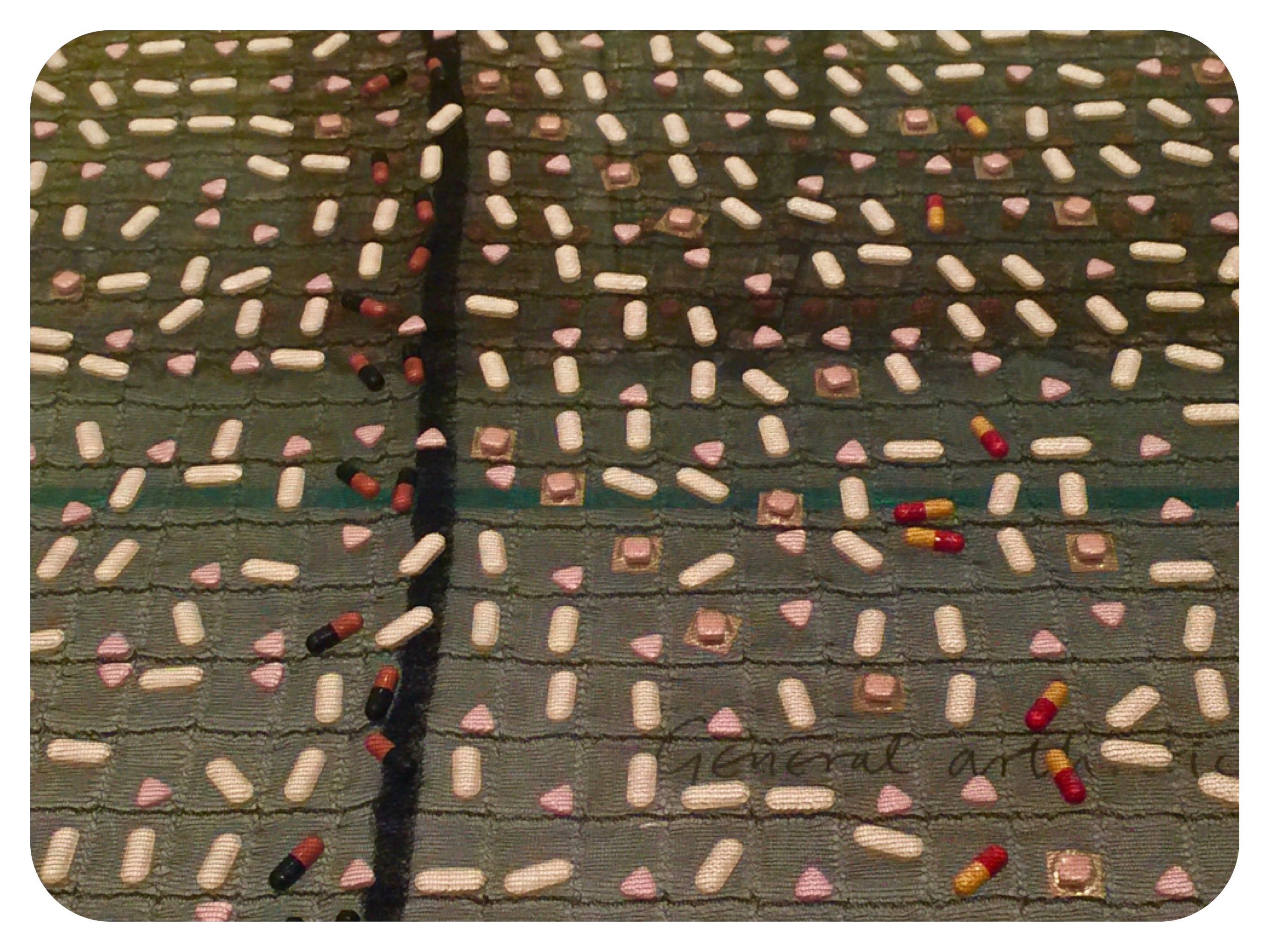

Medicine, Pills, Health insurance, and why I choose not to participate
During our stay in London, we saw a striking exhibition in the British Museum called “Cradle To Grave.”
“Cradle To Grave” is a contemporary piece done by Susie Freeman, a textile artist, and David Critchley, a videographer.
Their piece includes photos and two very long fabric runners, about a meter wide each and perhaps twenty meters long.
Inside each of these fabric pieces are 14,000 medicinal pills.
Apparently, every person in the U.K. will consume an average of 14,000 pills in his or her lifetime, from Cradle to Grave. Eighty percent of them will be taken in the last ten years of life.
These pills include prescriptions for all sorts of ailments, including antibiotics, diabetes, high blood pressure, pain killers, flu medicine, pregnancy and contraception, cancer pills, hormones, etc.
In addition to the long list of medicinal pills, people also take daily vitamin pills, immunity boosters, performance enhancement pills, diet pills and many more.
Once I saw how many sacks of sugar and cows the average meat eater eats in his or her lifetime, and it was a real eye opener.
Seeing the fabric panels holding the thousands of prescription pills that most people take in their lifetimes, was very sad.
The fact that the pills were inserted into small pockets sewn into the fabric, was very symbolic, as pills in “modern” medicine are truly woven into the mass consciousness of our culture.
But how did it all start?
When did we become a culture of people who turn to medicine for everything, forgetting how to promote natural health with no external aids?
Recently, just before we left Auckland, NZ, we saw a movie called “Knock.”
It was produced in 2017 and is a great story based on true events.
I highly recommend you go see it.
Knock is a gambler and a thug, who becomes a doctor completely by chance.
While trying to run away from his many creditors, he signs up for the job of a ship’s doctor.
Without any medical knowledge whatsoever, he learns to treat sick patients on board the ship, by reading medical books and picking up tips about treatments from the patients themselves.
When the ship docks on shore some months later, he continues impersonating a doctor.
Years later, he arrives in the small village of Saint-Maurice to try to make his fortune.
Apparently his gambling addiction, to make lots of money and fast, was still a strong force inside him.
The old village doctor was retiring, and the village needed a replacement doctor.
The “problem” was, that the villagers didn’t really rely on medicine or on the doctor for anything.
They were mostly healthy, and when they were sick, the old and kind doctor asked them to rest, relax, drink herbal tea with lemon and honey, sleep more and wait until they recover.
The local pharmacist was without any business, as his dusty pharmacy had no clients.
The pharmacist’s greedy wife, who was very unhappy with her situation, bemoaned the fact that they had no money.
When Doctor Knock arrived, he wanted to change all this, because he was not after making a modest life in a small rural village; he had it in mind to make a lot of money.
Little by little he convinced the village people that they needed vitamins and medicine in order to PREVENT sickness.
He also convinced them that they needed routine checkups on a regular basis, in order to make sure that they were healthy.
At first he offered free checkups, but always made sure to convince the patients that something could be done to improve their health.
In no time, his medical practice was thriving.
The pharmacist was quickly becoming wealthy, and the old hotel in town was converted into a modern hospital.
It was a funny movie that carries a lot of truth in it.
People today do not know that “modern medicine” is actually a very new phenomenon.
Doctors started out not with education about the body and its many ailments, but as people who sold potions in markets, going from village to village.
Many of them were considered charlatans and black magicians.
Potions and pills were looked down upon by townspeople and were considered black magic.
A bit later on, cures were obtained by going to a rural sanitarium, resting, eating healthy food, taking hot mineral springs baths, communing with nature and sleeping.
The idea that you needed to “insure your health” was considered the work of greedy bankers and insurance companies, not at all the way it is considered today.
Today, you are looked on as an irresponsible person if you do NOT have health insurance, or do not go for a checkup every six months, even though you might be very healthy.
Nowadays, good health is considered to be an unstable state, one that can change into sickness at any moment.
When I did more research into the rise of medicine, the reliance on doctors and hospitals and the rise of health insurance, I found that these phenomena only started much later, with the beginning of the world wars.
These massive and very damaging wars left many people badly injured and in need of a different kind of help.
Even later came the rise in “preventative medicine.”
Opportunistic companies realized that healthy people, who are concerned about being able to retain their health, will buy vitamins, minerals and supplements, and thus the pharmaceutical industry grew even faster.
It is only in the 21st century that doctors and surgeons have become minor gods in our societies, supposedly holding some secret “keys” to the kingdom of health.
Recently in an antique shop, I came upon an old advertisement, selling the need to buy health insurance to the broad population.
It seemed almost comical, yet nowadays selling people health insurance has become a very lucrative business.
Nobody can insure your health.
They can help you pay for treatment if you get sick, but no insurance company can help you to protect your health.
The idea of selling “health” insurance, to provide healthcare in case of illness, only started in the late 19th century.
At that time, "accident insurance" began.
The first company to offer accident insurance was the Railway Passengers Assurance Company, formed in 1848 in England.
Accident insurance was offered to insure against the rising number of fatalities that happened on the railway system.
The insurance policies offered assurance or insurance, for people travelling by railway.
The first accident insurance company reached an agreement with the railway companies, whereby the basic accident insurance was sold as a package deal, along with travel tickets to customers.
This is how health insurance companies got into the mainstream of society.
It only amounted to pennies that were added to the ticket prices, and so nobody objected.
The company charged higher premiums to second and third class travelers, because there was a higher risk of injury for people riding in those roofless carriages.
But if you wanted to travel at all, it was part of the package deal, and so you had to pay the insurance cost.
In the United States during the Civil War, similar accident insurance plans started to emerge, providing coverage for injury related travel by railroad or by steamboats.
“Sickness insurance” was developed later, in order to provide individuals supplementary income in case of a loss of wages, due to a prolonged sickness.
“Health insurance” is a much more recent term, that started being used to indicate a contract between the individual and a provider.
The individual agrees to pay a regular premium, with the expectation that should something happen, the insurer will cover the healthcare costs of the individual.
The term “health insurance“ replaced the term “sickness insurance,” simply because it sounded more positive and was more likely to appeal to people.
The British passed their National Insurance Act in 1911, changing the term “sickness insurance” to “health insurance,” and the original term fell out of favor.
At the beginning of the 20th century, health insurance was rarely used by anyone.
The reason people refused to pay for health insurance was because “modern medical technology” was so backwards, that very little could be done to help most sick patients anyway.
Most patients were treated in their homes, and the concept of Insurance being used to pay for hospitalization, was much less relied upon than it is today.
Now that I’ve bored you with this brief history of medicine and health insurance, allow me to get personal.
I take NO pills, NO supplements, NO vitamins, and I have NO health insurance.
I believe that Perfect Health is the natural state of the body.
Sickness is caused by a disturbance in the natural harmony of our being.
Disease truly is a Dis-Ease..... a lack of harmony in our minds that is chosen and then solidifies in our bodies.
The body is a denser energy field that reflects our inner thoughts and beliefs.
The cause of most diseases is a lowering of our divine vibratory rate from operating on high vibrations, love and harmony, to a lower vibration which leaves us vulnerable to dis-ease.
Many aches and pains are anger, blame and guilt, coursing through our minds and settling into our bodies.
The body is organic and is in harmony with its living environment.
This means that we are not as vulnerable to environmental conditions as we believe we are.
Our bodies are comprised of millions of tiny organisms, microscopic creatures that live inside, around and on our skin.
If you ever get a chance to see the Australian mini TV series “”Life On Us,” I highly recommend it.
It will give you great insight into how complex the microbiology of our bodies truly is, and how our bodies are truly a Cosmos, a complex living universe for all the millions of microbes who live in and on us.
The ancient Chinese believed that the harmony of the body can be controlled by paying attention to the elements and to the temperature.
It is believed that high fever is a result of excess inner fire, while a cold is a drastic drop in the body’s naturally warm temperature.
To keep the body in harmony and in balance, you eat either “cooling” or “warming” foods and drinks, based on what is needed.
Excess inner fire is caused by anger, ignorance, jealousy holding grudges, judging others, guilt and having an unforgiving attitude, just to name a few.
Excess inner coldness is caused by apathy, lack of love and lack of care for self and others, being discouraged, disheartened, losing hope and lack of optimism, fear and lack of inner warmth, happiness and joy.
So... after saying all this, how do I stay healthy, and why do I not pay for health insurance or travel insurance?
I do not pay for health insurance because I believe that healthcare is a home remedy.
If I ever lower my vibrations and get cancer or another terminal illness, I will NOT take the treatment of radiation and operations, I will instead aim to change my mind towards love, forgiveness of all and health, or depart this earth.
With few exceptions when we travel or dine out, I eat mostly fruit, vegetables, whole grains and legumes.
I believe I should try to stay lean and fit for life.
The advice that Paramahansa Yoganandya told his students, like me, is to “eat what an athlete eats.”
Nowadays, I research what athletes eat, and here is a recent bit of advice that I got from their trainers:
“FAT LOSS happens not on the course nor in the Gym, but in the kitchen.
Eat less food in general.
Fast and fast often.
Skip meals.
Reduce portions.
Eat more vegetables.
Drink water.
Exercise is mostly worthless in promoting fat loss.
Just eat less.”
I also do not believe that accidents happen by accident or arbitrarily.
Have you ever noticed that some people are accident prone, and get injured frequently, while others rarely get hurt?
Be mindful!
Pay attention!
Move slowly and look around you.
Always give others the right of way, or let those who are in a rush pass you.
Hold only love inside and.you will see that without inner anger, whether directed towards others or yourself, you will pull your hand a second before accidents happen.
You will suddenly notice more things and walk with more awareness.
You will not have accidents.
So how much money have I spent on hospitals, doctors and medicines in the last decades?
Nothing.
I have held on to my principles and attracted no diseases, no hospitalizations, and I have traveled the world extensively with no accidents.
If I need minor help, I do intuitive home care which includes meditation, sleep, rest, fasting with fresh juice, quiet and isolation, art therapy, reading the spiritual Masters to understand the nature of Truth and trusting the God within me, to show me the way....
This is not an advice I offer you here.
I simply share what works for me, with the hope it will make you reflect and fine tune your own ways.
With love and light,
Tali